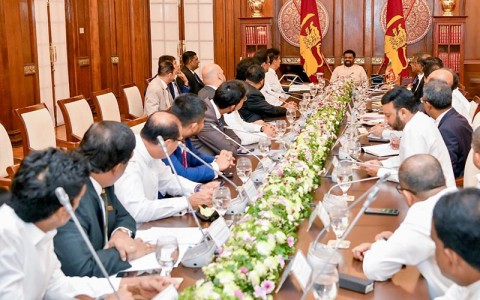
A meeting of party leaders, convened by President Anura Kumara Disanayake, was held today (10) at the Presidential Secretariat to discuss the impact of recent US Tariffs on Sri Lanka’s economy and the proposals to discuss this with the US government.
This meeting was convened in response to a request made by several opposition Members of Parliament, who highlighted the importance of engaging in dialogue regarding this issue with the President.
The President briefed the party leaders on the findings of the Committee appointed to conduct an in-depth study on potential issues that may arise due to the new reciprocal tariff system introduced by the US and to submit recommendations to the government.
A thorough discussion was held regarding the main issues highlighted by the Committee and the suggestions presented by opposition parties.
The discussion also addressed possible frameworks for engaging in dialogue with the United States, as well as the necessity for Sri Lanka to diversify its export markets to reduce potential negative impacts.
The proposals discussed in the meeting, along with the Committee’s recommendations, will be compiled and advanced for further deliberation.
The meeting was attended and expressed their views during the meeting by Leader of the Opposition Sajith Premadasa, MP Harsha de Silva representing Samagi Jana Balawegaya, MP S. Rasamanickam from Tamil National Alliance, MP Ravi Karunanayake from New Democratic Front, MP D.V. Chanaka from Sri Lanka Podujana Peramuna, MPs Mano Ganesan and Palani Digambaram from Tamil Progressive Alliance, MP M.L.A.M. Hizbullah from Sri Lanka Muslim Congress, MP Rishad Bathiudeen from All Ceylon Makkal Congress, MP Dilith Jayaweera from Sarvajana Balaya Party, MP Jeevan Thondaman from United National Party, MP Dayasiri Jayasekara from Sri Lanka Freedom Party and MP A. Archuna representing 17 Independent Groups. Additionally, the meeting was attended by MPs Gayantha Karunathilaka, Kavinda Jayawardena, S.M. Marikkar and Kader Masthan.
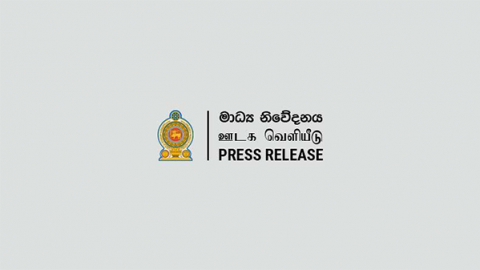
A meeting will take place tomorrow (10) at 11:00 am at the Presidential Secretariat, where President Anura Kumara Disanayake will engage in discussions with opposition party leaders about the impact of the new US reciprocal tariff system on Sri Lanka.
During this meeting, it is expected to outline the steps the Government has already implemented in response to the new US import tax policy.
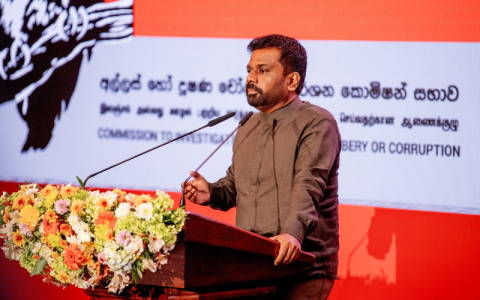
• Enforcing the Law Against Corruption is Not Political Revenge but a Moral Duty
• The Law Will Be Strictly Enforced Against the Official Mechanism that Engages in Corruption
– President says at the Launch of the National Anti-Corruption Action Plan
President Anura Kumara Disanayake stated that since assuming office, the current government has taken decisive steps to free the process of combating bribery and corruption from political interference. He emphasised that while the political mechanism has been liberated from engaging in such crimes, it is now the responsibility of the administrative machinery operating beneath that political structure to fall in line and correct its course without delay.
He explained that a grace period of six months has already been provided for the state officials to adjust to this new direction. The President firmly warned that if the public service mechanism fails to act appropriately within this period, the government will not hesitate to take firm legal action against those officials from May onwards.
President Disanayake expressed these views today (09), participating in the launch of the National Anti-Corruption Action Plan 2025–2029, held at the Bandaranaike Memorial International Conference Hall (BMICH) in Colombo.
The President pointed out that bribery and corruption have destroyed the dignity and values of Sri Lanka’s state administration and caused the nation to fall behind for decades in the eyes of the world. He reiterated that enforcing the law against these crimes is not an act of political revenge but a profound human responsibility.
He observed that over the past six months of the present government, no section of the public service has been allowed to collapse and that if officials continue to resist change, the government will proceed to remove and replace them after May.
The President stressed the need to build a society that respects the law and fears wrongdoing, adding that conducting lectures or workshops alone would not suffice in achieving this goal. He emphasised that people must practically witness that any person who commits a crime will be subjected to punishment under the law.
President Disanayake noted that corruption in Sri Lanka ranges from minor bribery, such as obtaining medicine through corrupt means at a rural dispensary, to grave financial crimes like looting the Central Bank. He stressed that although corruption may appear to start small, it has expanded to deeply inhumane levels.
He further accused previous rulers of safeguarding and protecting those engaged in corrupt activities, allowing such practices to spread from village-level institutions to the highest financial institutions in the country.
He also revealed that within several state administrative institutions and even among certain bodies responsible for enforcing the law, criminal networks consisting of organised corrupt officials and underworld elements have been operating, creating systemic webs of theft and fraud. He confirmed that these criminal networks have already been identified and assured that measures will be implemented in the future to dismantle and eliminate them.
President Disanayake solemnly pledged that the responsibility of eradicating bribery and corruption will not be passed on to the next generation but will be resolved within this generation itself, under the leadership of the present government.
Drawing a comparison with India, which gained independence a year before Sri Lanka, the President noted that through a consistent national policy framework, India has successfully achieved space exploration and built a massive workforce in the software industry. In stark contrast, he pointed out that Sri Lanka, due to poor decisions made by its political leadership, was declared a bankrupt state in 2022.
He further stated that the current government has taken on the responsibility of leading Sri Lanka towards the international stage through a national policy framework that ensures transparency and accountability for every rupee spent from public funds.
The President added that by implementing this framework, it is possible to build public trust in law enforcement and judicial institutions and that it must be made clear to the people that there will be no mechanism available for anyone to escape the law after committing a crime.
He stated that the purpose of the National Anti-Corruption Action Plan 2025-2029 is to guide the country towards becoming a nation of integrity. The government plans to establish internal control units within all state institutions, under the leadership of the Presidential Secretariat and implement a system for monitoring these units through digital technology to ensure accountability and transparency.
The Action Plan has been designed around four key strategic priority areas: prevention and education, public participation, institutional strengthening and the enforcement of law along with reforms in law and policy.
The President highlighted that eliminating bribery and corruption is one of the most decisive factors in a country’s development and progress. In Sri Lanka, the Commission to Investigate Allegations of Bribery or Corruption (CIABOC) has been identified as the leading state institution entrusted with strengthening this mechanism. Accordingly, it was recognised that a robust national anti-corruption policy that operates across all sectors is essential to creating a corruption-free society.
In preparing this Action Plan, CIABOC engaged all relevant stakeholders by conducting extensive programmes at both national and provincial levels. A broad public consultation process was carried out, including a comprehensive survey to assess public opinion on corruption through media announcements in all three languages and via social media networks.
This process gathered proposals from a diverse range of participants, including Members of Parliament, judges, state officials, the private sector, international organisations, civil society organisations, community-based organisations, religious groups, persons with special needs, media professionals, youth, children and the general public. Additionally, foreign state experiences and suggestions from various groups across all provinces were taken into consideration when formulating the Action Plan.
By implementing this National Anti-Corruption Action Plan, the government hopes to foster a committed citizenry determined to combat corruption, a political will fully supportive of this effort, a comprehensive legal framework and a disciplined, transparent public service across all sectors, with the shared vision of building a country of integrity for future generations.
Addressing the event, the Japanese Ambassador to Sri Lanka, HE ISOMATA Akio, stated that Corruption remains a great challenge for many countries, including Sri Lanka as it undermines economic growth, weakens public trust in government institutions and discourages foreign investment. However, he noted that due to the reform initiatives of the present government, investors are once again showing increasing interest in Sri Lanka.
Ambassador ISOMATA Akio further stated that Japan has always believed that transparency and good governance are fundamental pillars for sustainable economic development and therefore, has supported anti-corruption initiatives globally for over a decade.
Meanwhile, the UNDP Resident Representative in Sri Lanka, Ms. Azusa Kubota, stated that according to Sri Lanka’s first-ever National Taxpayer Perception Survey conducted last year, 84% of respondents indicated that corruption directly affects their willingness to pay taxes.
She further noted that corruption deters investment, increases the cost of doing business, undermines sustainable development and human security, and causes an estimated annual loss of USD 1.3 trillion for developing countries.
Referring to the Budget Speech delivered by the President, Ms. Kubota emphasised that the State must be accountable for every cent of taxpayers’ money and stated that this Action Plan would serve as a roadmap for transforming Sri Lankan society.
The event was attended by the Chief Justice of the Supreme Court, Justice Murdu Nirupa Bidushinie Fernando; the Attorney General, Parinda Ranasinghe PC; the Secretary to the President, Dr. Nandika Sanath Kumanayake; the Chairman of CIABOC, former High Court Judge Neil Iddawela; the Director General of CIABOC, R.S.A. Dissanayake; the Commanders of the Tri-Forces; the Inspector General of Police; senior officials from the security forces and a large number of state officials.
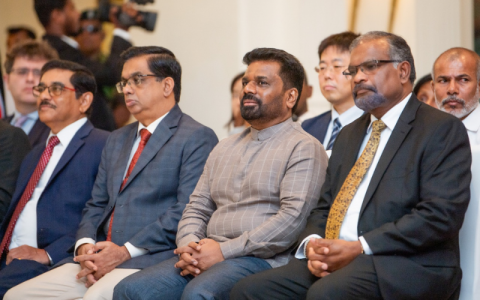
The book “Sri Lanka’s Economic Revival – Reflection on the Journey from Crisis to Recovery” ,authored by Secretary to the Ministry of Finance, Mr. Mahinda Siriwardana, was officially launched this morning (08) at the Galle Face Hotel, Colombo, with the participation of President Anura Kumara Disanayake.
The first copy of the publication was formally presented to President Disanayake by Mr. Siriwardana during the event.
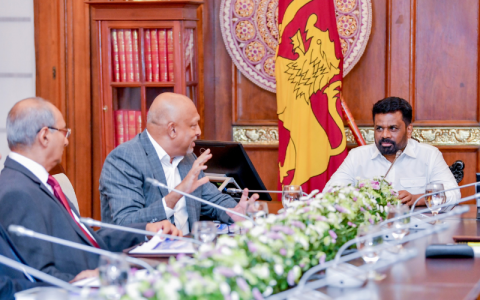
A meeting between President Anura Kumara Disanayake and senior officials of SriLankan Airlines was held this afternoon (April 8) at the Presidential Secretariat.
The discussions mainly focused on proposals to transform SriLankan Airlines into a more profitable state-owned enterprise. Special attention was also given to possible short-term and long-term solutions for the airline’s debt management.
The talks further explored new investment opportunities for the airline. The President instructed the officials to take all necessary steps to transform SriLankan Airlines into a profit-making entity.
Although the airline has recorded operational profits, due to past mismanagement and poor decision-making, it remains one of the leading loss-making state enterprises. The current government has decided to reverse the previous administration’s decision to privatize the airline. Instead, it plans to continue operating it as the national carrier while introducing a new management structure to ensure its profitability moving forward.
Minister of Labour and Deputy Minister of Economic Development Dr. Anil Jayantha Fernando, President’s Senior Advisor Duminda Hulangamuwa, Chairman of SriLankan Airlines Sarath Ganegoda along with several senior officials of SriLankan Airlines, were present at the meeting.
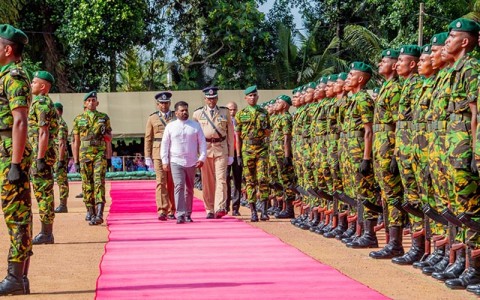
– President says participating in the 82nd STF Passing Out Parade
Attending the passing out parade of the 82nd batch of the Special Task Force (STF) at the Katukurunda STF Training Camp in Kalutara today (07), President Anura Kumara Disanayake emphasized the need for a progressive transformation within the Sri Lanka Police to ensure the rule of law, order and authority.
The President noted that the public places its trust in the Sri Lanka Police to uphold the supremacy of the law and maintaining that trust is a fundamental responsibility of the Police Department.
Addressing the newly commissioned officers, President Disanayake stated that how one serves and respects their profession is reflected in their career and urged the officers to embrace their professional duty in a way that contributes meaningfully to the transformative change the country requires.
Highlighting the current state of institutional breakdown in many sectors, the President pointed out that the people have already initiated change by altering the political authority, but reiterated that political transformation alone is insufficient. Instead, a comprehensive and positive transformation across all sectors is necessary for national progress.
The President further emphasized that new police officers carry the responsibility of meeting public expectations. He called on them to ensure public safety and security and to prevent the nation from falling prey to organized crime and drug-related issues.
He also stated that the younger generation must take responsibility for the motherland, bearing that duty on their shoulders and should strive to steer both their personal future and the future of the country in a positive direction.
President Disanayake concluded by saying that joining the regular service of the Sri Lanka Police today should be remembered by all as a significant and powerful step forward.
The President further noted that the service rendered by the Special Task Force (STF) on behalf of the public during times of emergency and disaster is highly commendable.
A total of 118 newly recruited Sub-Inspectors and 231 Probationary Police Constables who successfully completed their basic training graduated during the ceremony.
President Anura Kumara Disanayake awarded certificates and honours to officers who demonstrated exceptional performance during the training programme.
A commemorative token was also presented to President Disanayake, who attended the ceremony as the Chief Guest.
An operational demonstration by STF officers on a simulated battlefield was presented as part of the event.
Established in 1983 under the theme “Victory is Certain”, the Sri Lanka Police Special Task Force is currently recognized as a prestigious unit deployed for VIP protection, crime and organized crime suppression and narcotics control efforts aimed at building a drug-free nation.
The ceremony was attended by Minister of Public Security and Parliamentary Affairs Ananda Wijepala, Minister of Health and Mass Media Dr. Nalinda Jayatissa, Deputy Minister of Public Security Sunil Watagala, Secretary to the Ministry of Public Security Ravi Seneviratne, Acting Inspector General of Police Priyantha Weerasooriya, STF Commanding Officer Senior Deputy Inspector General of Police Samantha de Silva, along with other senior police officers, the parents of graduating officers and other invitees.
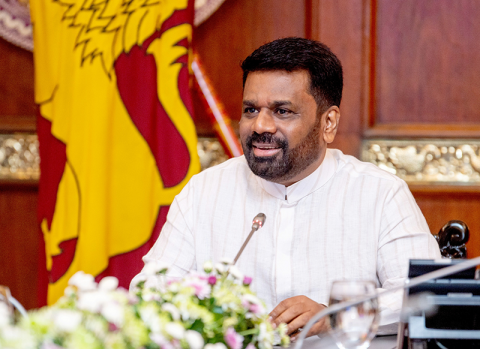
A meeting between President Anura Kumara Disanayake and representatives of the International Monetary Fund (IMF) was held this morning (07) at the Presidential Secretariat.
The discussions centred on the preliminary review associated with the fourth tranche of Sri Lanka’s Extended Fund Facility (EFF) arrangement with the IMF.
Key focus areas included Sri Lanka’s progress thus far under the IMF-supported programme and the next steps required to achieve the country’s future economic targets.
Both parties also exchanged views on emerging economic challenges, particularly in light of new trade tariffs proposed by the United States and their potential implications for Sri Lanka.
The IMF delegation was led by Mr. Sanjaya Panth, Deputy Director for the Asia and Pacific Department and included Mr. Peter Breuer and Mr. Evan Papageorgiou, Senior Mission Chiefs.
Representing the Government of Sri Lanka were Minister of Labour and Deputy Minister of Economic Development Anil Jayantha Fernando, Deputy Minister of Finance & Planning, Harshana Suriyapperuma, Governor of the Central Bank Dr. Nandalal Weerasinghe, Senior Economic Advisor to the President Duminda Hulangamuwa and Secretary to the Ministry of Finance Mahinda Siriwardena.
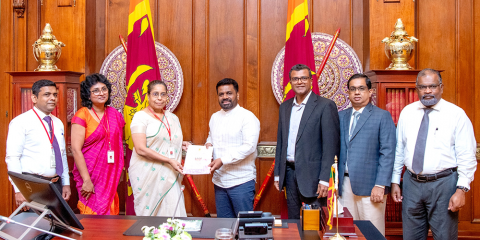
The report of the “Census of Population and Housing 2024,” conducted by the Department of Census and Statistics, was officially handed over to President Anura Kumara Disanayake this morning (07) at the Presidential Secretariat.
This preliminary report has been prepared based on island wide data collected between October and December 2024.
The report provides details on Sri Lanka’s population, its growth and the distribution of the population across districts.
The information gathered through the census is vital not only for the government but also for other institutions in formulating policies and development plans essential for the country’s progress. Significantly, for the first time in the history of census-collecting in Sri Lanka, data collection was carried out using tablet computers and user-friendly mobile devices.
The event was attended by Deputy Minister of Finance & Planning, Harshana Suriyapperuma, Secretary to the President Dr. Nandika Sanath Kumanayake, Secretary to the Ministry of Finance Mahinda Siriwardana, Director General of the Department of Census and Statistics D.D.G.A. Senevirathne and several other officials.
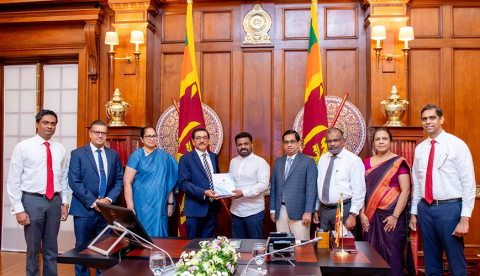
• Central Bank Presents Annual Economic Review 2024 to President
The Central Bank of Sri Lanka today (07) presented its flagship publication, the Annual Economic Review for 2024 (AER 2024), to President and Minister of Finance, Anura Kumara Disanayake, highlighting the steady progress of Sri Lanka’s economic recovery following the country’s most severe downturn in recent history.
The report was officially handed over by Dr. P. Nandalal Weerasinghe, Governor of the Central Bank, during a special ceremony held at the Presidential Secretariat.
AER 2024 comprises four main chapters: Macroeconomic Developments, Conditions of the Financial System, Review of Central Bank’s Policies and Macroeconomic Outlook.
According to the Review, the Sri Lankan economy showed significant signs of recovery in 2024, following the deep economic crisis experienced two years ago. The recovery trajectory, though challenging, has been notably faster than that of many other debt-distressed countries.
Improvements in economic activity, a partial resurgence in purchasing power and reduced uncertainty are among the key positive indicators noted in the report.
The event was attended by Dr. Nandika Sanath Kumanayake, Secretary to the President, Mr. K. M. Mahinda Siriwardena, Secretary to the Treasury, Mrs. K. M. A. N. Daulagala, Senior Deputy Governor, Dr. C. Amarasekara, Assistant Governor, Dr. (Mrs.) S. Jegajeevan, Director of Economic Research and Dr. L. R. C. Pathberiya and Additional Director of Economic Research at the Central Bank Dr. V. D. Wickramarachchi.
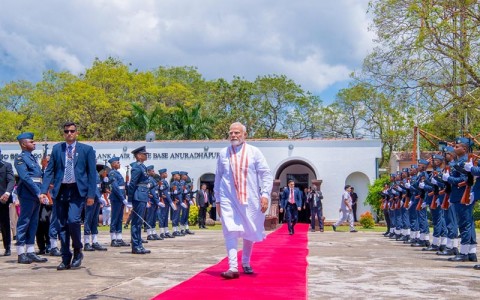
Indian Prime Minister Shri Narendra Modi departed today (06) from Air Force Base Anuradhapura concluding his State visit to Sri Lanka. The Indian Premier embarked on a tour to Sri Lanka following an invitation from President Anura Kumara Disanayake.
This visit underscores the enduring relationship encapsulated by the theme “Friendship of Centuries, Commitment to a Prosperous Future,” further solidifying the bonds between India and Sri Lanka.
This marks the Indian Prime Minister’s fourth visit to Sri Lanka, which has further enhanced the economic, cultural, and historical relations between the two nations, while also reinforcing their multifaceted partnership. This visit by the Indian Prime Minister reinforces Sri Lanka’s important role in India’s “Neighbourhood First Policy” and ‘MAHASAGAR’ vision concerning diplomatic relations.
This state visit is anticipated to yield significant results on various collaborative initiatives, fostering a path towards mutual growth and development. The citizens of Sri Lanka will soon be able to witness the fruitful outcomes of these partnerships, and Indian Prime Minister Shri Narendra Modi’s visit will mark a significant milestone in the government’s pursuit of sustainable development focused on the needs of the people.
Accompanying Indian Prime Minister Modi were Indian External Affairs Minister Dr. S. Jaishankar, National Security Advisor Ajit Doval, Foreign Secretary Vikram Misri and a delegation of senior officials from the Indian government.


